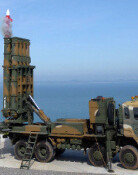Mass Migration of Korean-Chinese Causing Headache for Construction Companies
Mass Migration of Korean-Chinese Causing Headache for Construction Companies
Posted August. 16, 2002 22:05,
T Development, a construction company specializing in frame works, has recently sustained a huge loss. It could not meet the construction schedule for building an apartment complex. Simply it could not get enough workers.
But, the problem that harassed the company more was the Korean-Chinese workers. 20 Korean-Chinese on its payroll suddenly quit the company and teamed up with another company. Despite the companys repeated requests for coming back, they replied, Unless you raise our wages, we will not return.
Korean-Chinese construction workers are getting organized. In the past, they were looking for jobs on an individual basis. But now, they are moving in a group of about 10 people. The construction industry has been suffering from their sudden congregate migrations. It is not unusual they quit in the middle of a construction project and start working for another company.
▽ Congregate movements of Korean-Chinese workers = It was about 10 years ago that Korean-Chinese first began to appear in the construction industry. Currently, their number is estimated to reach 500,000.
Originally, Korean foremen hired them as stopgap workers to fill up for the absent Korean workers. But now, including the foremen themselves, most workers are Korean-Chinese.
Mr. A, a Korean-Chinese working in the apartment complex project in Koyang City, Kyunggi Province, said, When it comes to frame works, 70% of the workers are Korean-Chinese.
The main role performed by a foreman is to compare wages offered by companies. The foreman compares wages through a web of foremen scattered around via cellular phone. Among the foremen, those who are most familiar with Korea take charge of negotiations for wage.
Once the wage is decided, the workers migrate themselves all of sudden. That is why construction companies complain of difficulty in managing workers.
Mr. A said, If you want to come to Korea, you have to pay 10 million won as commission to an immigration agent. Since I have to at least get even during a fixed period of time, I dont mind working where I get paid more.
▽ Bleeding war for hosting workers = The war between domestic companies is fierce to secure more workers.
Kim Sang-ho, a manager of Dae Lim Co., complained, Due to the fierce competition, the gap between Korean-Chinese workers and their Korean counterparts has been narrowed almost to zero. Two years ago, the daily wage for a carpenter was 80,000 won (circa. $60). But now, we have to pay 130,000 won for the same worker.
The situation is better for big companies. But the companies that directly manage the Korean-Chinese workers are severely suffering from the labor shortage.
One official of T Development confessed, If we fail to meet the deadline, we will have difficulty in future bidding. Thus, we have to raise wages even to our loss.
Ki-Jeong Ko Hyung-June Park koh@donga.com lovesong@donga.com



![[속보]“하메네이 아들, 이란 차기 최고지도자로 선출”](https://dimg.donga.com/c/138/175/90/1/wps/NEWS/IMAGE/2026/03/04/133459477.1.jpg)
![매일 반복하는 이 습관, 동맥을 야금야금 망가뜨린다[노화설계]](https://dimg.donga.com/c/138/175/90/1/wps/NEWS/IMAGE/2026/03/03/133455012.3.jpg)


